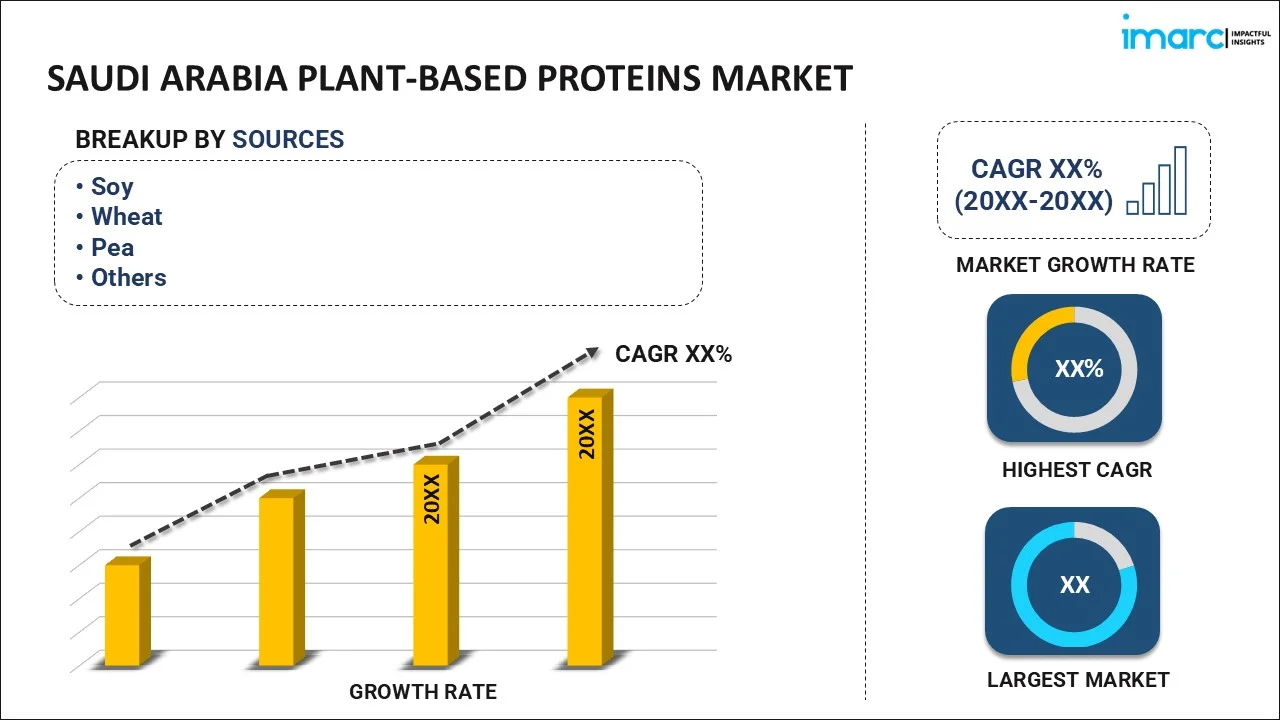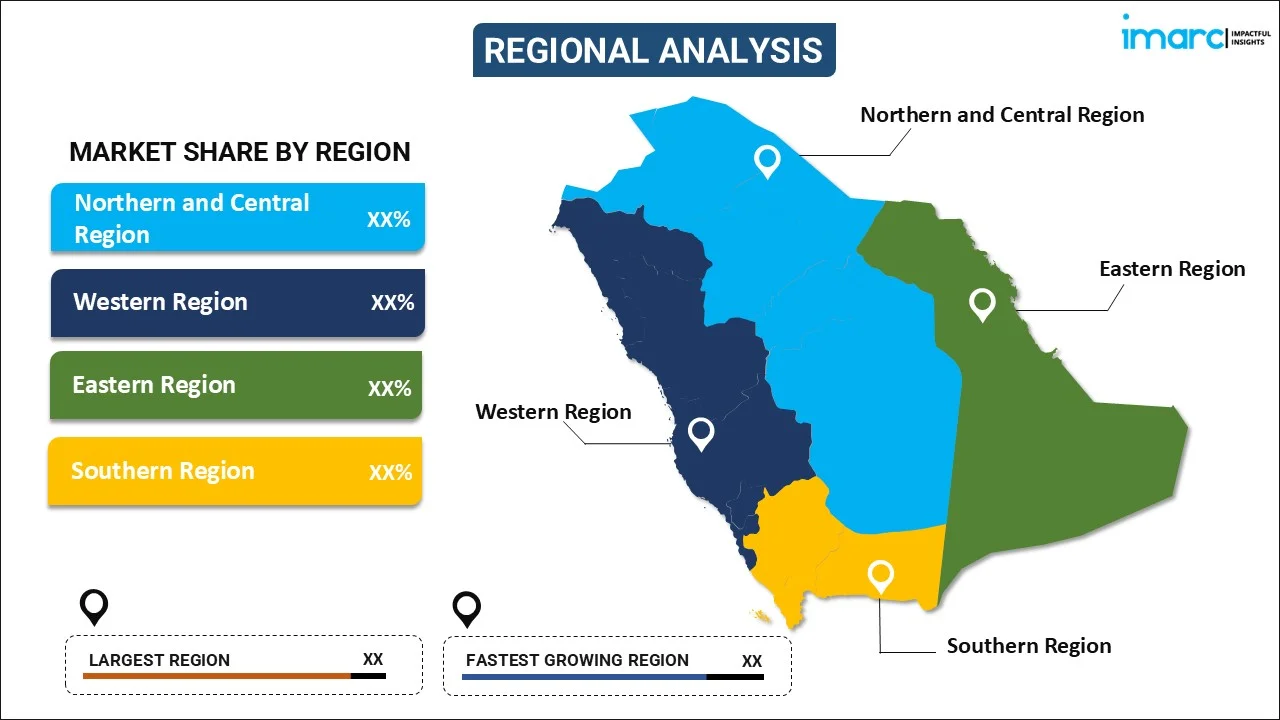
Saudi Arabia Plant-Based Proteins Market Size, Share, Trends and Forecast by Source, Type, Nature, Application, and Region, 2025-2033
Saudi Arabia Plant-Based Proteins Market Overview:
The Saudi Arabia plant-based proteins market size reached USD 0.07 Billion in 2024. Looking forward, IMARC Group expects the market to reach USD 0.13 Billion by 2033, exhibiting a growth rate (CAGR) of 6.53% during 2025-2033. The growing focus on promoting healthy eating habits and reducing dependency on imported foods, rising incorporation of vegan recipes in menus of major fast-food chains and quick-service restaurants (QSR), and increasing number of online shopping channels are some of the factors impelling the Saudi Arabia plant-based proteins market growth.
|
Report Attribute
|
Key Statistics
|
|---|---|
|
Base Year
|
2024 |
|
Forecast Years
|
2025-2033
|
|
Historical Years
|
2019-2024
|
| Market Size in 2024 | USD 0.07 Billion |
| Market Forecast in 2033 | USD 0.13 Billion |
| Market Growth Rate (2025-2033) | 6.53% |
Saudi Arabia Plant-Based Proteins Market Trends:
Growing Presence in Fast Food and Quick-Service Outlets
Numerous fast-food chains and quick-service restaurants (QSR) in Saudi Arabia are adding plant-based protein options to their menus to meet the increasing need for meat-free or healthier meal selections. Common items such as burgers, wraps, and salads feature plant-based ingredients, including options derived from vegan sources including soy and pea proteins. The inclusion of these options within familiar settings allows consumers to experience plant-based proteins in a way that is accessible and appealing, contributing to broader adoption across various dietary preferences. By expanding availability, these establishments help to shift consumer perceptions, positioning plant-based proteins as a convenient and satisfying choice. This widespread accessibility also underscores the role of the food service industry in promoting dietary variety, encouraging more individuals to incorporate plant-based options into their routines as part of a balanced and health-conscious lifestyle. In 2024, German Doner Kebab (GDK) launched eight new plant-based options, including the OV Kebab, in over 140 locations, including Saudi Arabia. The plant-based dishes feature Nestlé's Garden Gourmet Vegan Pulled Fillet, catering to the rising demand for plant-based fast food.
Government Initiatives and Sustainable Goals
Saudi Arabia’s Vision 2030 focus on sustainability, including promoting healthy eating habits and reducing dependency on imported foods is favoring the Saudi Arabia plant-based proteins market share. Part of this initiative includes the governing body of the local economy backing local plant-based protein raw material-producing products for a new growth opportunity in the sector. This emphasis matches the undercurrent of environmental shifts: Plant-based proteins have a smaller carbon footprint than animal-based products. These initiatives promote plant-based diets as a sustainable and ethical choice while encouraging citizens to embrace these options as part of a progressive national agenda, often in partnership with government-subsidized campaigns and food producers. In 2023, IFFCO Group introduced THRYVE™, its first 100% plant-based meat brand in Saudi Arabia, which was crafted to elevate local favorites including shawarma with sustainable, Middle Eastern-inspired flavors. The venture aligned with Saudi Vision 2030 and the UN’s Sustainable Development Goals, aiming to foster a resilient, eco-friendly food chain.
Increasing Accessibility Through E-Commerce Channels
The rise of e-commerce platforms in Saudi Arabia is enhancing accessibility to plant-based proteins for consumers. Therefore, this is creating a positive Saudi Arabia plant-based proteins market outlook. Leading online retailers and health-focused websites are offering numerous plant-based products, allowing consumers to sample and buy from the comfort of their homes. The availability of all this food removes the need to drive to the specialty stores that sell them, making it easier for consumers to incorporate such options into their daily meals. Younger age groups are more likely to shop online than older age groups, are also more likely to buy food online, and are more flexible regarding which cuisine to try. Additionally, e-commerce websites usually offer rich product descriptions, customer reviews, and nutritional information, enabling consumers to make educated decisions. The role of e-commerce in Saudi Arabia is crucial in the growth of plant-based proteins in the region through greater accessibility and increasing awareness of consumers. As per the data provided by the IMARC Group, in 2023, the e-commerce market in Saudi Arabia reached a size of USD 196 Billion.
Saudi Arabia Plant-Based Proteins Market Segmentation:
IMARC Group provides an analysis of the key trends in each segment of the market, along with forecasts at the regional level for 2025-2033. Our report has categorized the market based on source, type, nature, and application.
Source Insights:

- Soy
- Wheat
- Pea
- Others
The report has provided a detailed breakup and analysis of the market based on the source. This includes soy, wheat, pea, and others.
Type Insights:
- Concentrates
- Isolates
- Textured
A detailed breakup and analysis of the market based on the type have also been provided in the report. This includes concentrates, isolates, and textured.
Nature Insights:
- Conventional
- Organic
The report has provided a detailed breakup and analysis of the market based on the nature. This includes conventional and organic.
Application Insights:
- Food
- Meat Alternatives
- Dairy Alternatives
- Bakery Products
- Performance Nutrition
- Convenience Foods
- Others
- Feed
A detailed breakup and analysis of the market based on the application have also been provided in the report. This includes food (meat alternatives, dairy alternatives, bakery products, performance nutrition, convenience foods, and others), and feed.
Regional Insights:

- Northern and Central Region
- Western Region
- Eastern Region
- Southern Region
The report has also provided a comprehensive analysis of all the major regional markets, which include Northern and Central Region, Western Region, Eastern Region, and Southern Region.
Competitive Landscape:
The market research report has also provided a comprehensive analysis of the competitive landscape. Competitive analysis such as market structure, key player positioning, top winning strategies, competitive dashboard, and company evaluation quadrant has been covered in the report. Also, detailed profiles of all major companies have been provided.
Saudi Arabia Plant-Based Proteins Market News:
- December 2023: Swiss plant-based meat brand Planted plans to enter the UAE market and expand into Saudi Arabia, Bahrain, Oman, and Jordan. The company focused on offering sustainable, high-protein plant-based products made without additives.
- July 2023: Officials of Saudi Ministry of Environment, Water, and Agriculture have agreed to enhance plant-based food options by developing agricultural products that mimic the taste of animal proteins. The program's goal was to promote vegan choices, support food stability, and improve environmental sustainability in Saudi Arabia.
Saudi Arabia Plant-Based Proteins Market Report Coverage:
| Report Features | Details |
|---|---|
| Base Year of the Analysis | 2024 |
| Historical Period | 2019-2024 |
| Forecast Period | 2025-2033 |
| Units | Billion USD |
| Scope of the Report |
Exploration of Historical Trends and Market Outlook, Industry Catalysts and Challenges, Segment-Wise Historical and Future Market Assessment:
|
| Sources Covered | Soy, Wheat, Pea, Others |
| Types Covered | Concentrates, Isolates, Textured |
| Natures Covered | Conventional, Organic |
| Applications Covered |
|
| Regions Covered | Northern and Central Region, Western Region, Eastern Region, Southern Region |
| Customization Scope | 10% Free Customization |
| Post-Sale Analyst Support | 10-12 Weeks |
| Delivery Format | PDF and Excel through Email (We can also provide the editable version of the report in PPT/Word format on special request) |
Key Questions Answered in This Report:
- How has the Saudi Arabia plant-based proteins market performed so far and how will it perform in the coming years?
- What is the breakup of the Saudi Arabia plant-based proteins market on the basis of source?
- What is the breakup of the Saudi Arabia plant-based proteins market on the basis of type?
- What is the breakup of the Saudi Arabia plant-based proteins market on the basis of nature?
- What is the breakup of the Saudi Arabia plant-based proteins market on the basis of application?
- What is the breakup of the Saudi Arabia plant-based proteins market on the basis of region?
- What are the various stages in the value chain of the Saudi Arabia plant-based proteins market?
- What are the key driving factors and challenges in the Saudi Arabia plant-based proteins market?
- What is the structure of the Saudi Arabia plant-based proteins market and who are the key players?
- What is the degree of competition in the Saudi Arabia plant-based proteins market?
Key Benefits for Stakeholders:
- IMARC’s industry report offers a comprehensive quantitative analysis of various market segments, historical and current market trends, market forecasts, and dynamics of the Saudi Arabia plant-based proteins market from 2019-2033.
- The research report provides the latest information on the market drivers, challenges, and opportunities in the Saudi Arabia plant-based proteins market.
- Porter's five forces analysis assist stakeholders in assessing the impact of new entrants, competitive rivalry, supplier power, buyer power, and the threat of substitution. It helps stakeholders to analyze the level of competition within the Saudi Arabia plant-based proteins industry and its attractiveness.
- Competitive landscape allows stakeholders to understand their competitive environment and provides an insight into the current positions of key players in the market.
Need more help?
- Speak to our experienced analysts for insights on the current market scenarios.
- Include additional segments and countries to customize the report as per your requirement.
- Gain an unparalleled competitive advantage in your domain by understanding how to utilize the report and positively impacting your operations and revenue.
- For further assistance, please connect with our analysts.
 Request Customization
Request Customization
 Speak to an Analyst
Speak to an Analyst
 Request Brochure
Request Brochure
 Inquire Before Buying
Inquire Before Buying




.webp)




.webp)












